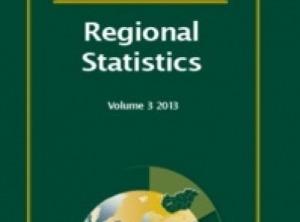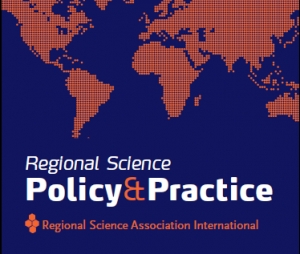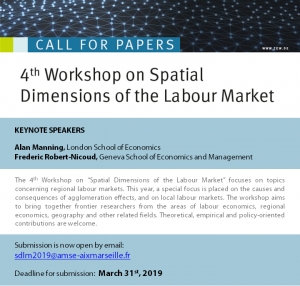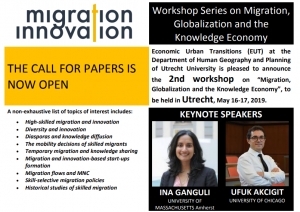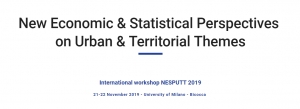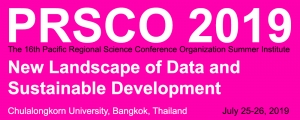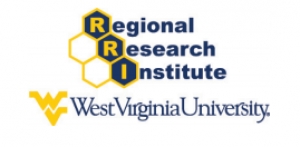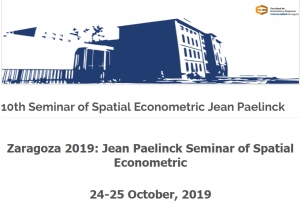Awards
Elisabete Martins
The New Issue of Regional Statistics is already Available!
THE NEW ISSUE OF REGIONAL STATISTICS IS ALREADY AVAILABLE!
We are pleased to inform you that a new issue of the Regional Statistics has been released and now it’s avaiable online.
http://www.ksh.hu/docs/hun/xftp/terstat/2018/eterstat1802.pdf
REGIONAL STATISTICS, 2018, VOL 8, No 2.
STUDIES
Donatello Caruso – Francesco Conto: Private capital in the rural development programme: the case of the Apulia Region, Southern Italy
http://www.ksh.hu/docs/hun/xftp/terstat/2018/rs080209.pdf
Gergely Tagai – Josef Bernard – Martin Simon – Bálint Koós: Two faces of peripherality: labour markets, poverty, and population dynamics in Hungary and Czechia
http://www.ksh.hu/docs/hun/xftp/terstat/2018/rs080204.pdf
Vidmantas Daugirdas – Gintarė Pociūtė-Sereikienė: Depopulation tendencies and territorial development in Lithuania
http://www.ksh.hu/docs/hun/xftp/terstat/2018/rs080203.pdf
Melinda Nagy-Molnár – Lendvay Endre: New method to support decision making process in the local economic development of Hungary
http://www.ksh.hu/docs/hun/xftp/terstat/2018/rs080207.pdf
Mátyás Szabó – Orsolya Pap-Szuromi – Róbert Romvári: Preliminary results of a farmstead survey of the Great Hungarian Plain –
http://www.ksh.hu/docs/hun/xftp/terstat/2018/rs080208.pdf
Tibor Kóti: Spatial differences regarding the chance to leave supported public employment in Hungary’s rural periphery
http://www.ksh.hu/docs/hun/xftp/terstat/2018/rs080210.pdf
Barbara Konecka-Szydłowska – András Trócsányi – Gábor Pirisi: Urbanisation in a formal way? The different characteristics of the ‘newest towns’ in Poland and Hungary
http://www.ksh.hu/docs/hun/xftp/terstat/2018/rs080202.pdf
Lyudmila Grigorievna Matveeva – Ol’ga Anatolievna Chernova – Natal’ya Alexeevna Kosolapova – Alexey Evgenievich Kosolapov: Assessment of water resources use efficiency based on the Russian Federation’s gross regional product water intensity indicator
http://www.ksh.hu/docs/hun/xftp/terstat/2018/rs080201.pdf
K.S. Akbash – N.О. Pasichnyk – R.Ya.Rizhniak: Generalization of calculation methods for gender indices in demographic and social statistics
http://www.ksh.hu/docs/hun/xftp/terstat/2018/rs080205.pdf
VISUALIZATIONS
Ladislav Novotný – Loránt Pregi: Visualization of migration using spatial interpolation method
http://www.ksh.hu/docs/hun/xftp/terstat/2018/rs080206.pdf
Join us to our social networking sites:
The latest issue of Regional Science Policy & Practice are available! Volume 11, Issue 1 Pages 1-209, March 2019
Regional Science Policy & Practice
Pages: 1-209
March 2019
ISSUE INFORMATION
Pages: 1-2 | First Published: 28 March 2019
SPECIAL SECTION: SPATIAL AND SOCIAL JUSTICE
Budy P. Resosudarmo, Ari Kuncoro, Geoffrey J. D. Hewings
Pages: 3-4 | First Published: 28 March 2019
![]() Open Access
Open Access
Yuri Mansury, Jae Beum Cho
Pages: 5-21 | First Published: 18 January 2019
Gender inequality among urban households in South Korea
Yuri Mansury, Kyung‐Heun Baek
Pages: 23-38 | First Published: 12 March 2019
![]() Open Access
Open Access
Mitsuhiko Kataoka
Pages: 39-54 | First Published: 29 November 2018
Aye Thu Zar Thein, Takahiro Akita
Pages: 55-70 | First Published: 12 March 2019
Inequality of opportunity, a matter of space?
Jesus Perez‐Mayo
Pages: 71-87 | First Published: 12 February 2019
![]() Open Access
Open Access
Are poor provinces catching‐up the rich provinces in Indonesia?
Hengky Kurniawan, Henri L. F. de Groot, Peter Mulder
Pages: 89-108 | First Published: 29 January 2019
Giovanni A. Barbieri, Federico Benassi, Marianna Mantuano, M. Rosaria Prisco
Pages: 109-121 | First Published: 20 November 2018
![]() Open Access
Open Access
A sectoral growth‐income inequality nexus in Indonesia
Iván González Gordón, Budy P. Resosudarmo
Pages: 123-139 | First Published: 20 June 2018
OTHER ARTICLES
Interpreting and understanding territorial identity
Roberta Capello
Pages: 141-158 | First Published: 07 December 2018
Hermanus Stephanus Geyer, Nhlapo Mosidi
Pages: 159-171 | First Published: 07 January 2019
Fiscal Decentralization – A Cautious Tale
Yizhou Zhang, Geoffrey J.D. Hewings
Pages: 173-187 | First Published: 09 January 2019
Kristine Laura Canales, Isabelle Nilsson, Elizabeth Delmelle
Pages: 189-202 | First Published: 27 February 2019
BOOK REVIEWS
Roberta Capello
Pages: 203-204 | First Published: 28 August 2018
The square and the tower: Networks and power, from the Freemasons to Facebook
Gordon F. Mulligan
Pages: 204-207 | First Published: 15 October 2018
The Cost–Benefit Revolution. Cass R. Sunstein
Amitrajeet A. Batabyal
Pages: 207-209 | First Published: 22 November 2018
Call for papers - 4th Workshop on Spatial Dimensions of the Labour Market (SDLM)
4th Workshop on Spatial Dimensions of the Labour Market
11–12 July 2019, Marseille, France
The 4th Workshop on “Spatial Dimensions of the Labour Market” focuses on topics concerning regional labour markets. This year, a special focus is placed on the causes and consequences of agglomeration effects, and on local labour markets. The workshop aims to bring together frontier researchers from the areas of labour economics, regional economics, geography and other related fields. Theoretical, empirical and policy-oriented contributions are welcome.
TOPICS OF INTEREST
The workshop has a special focus on agglomeration effects and on local labour markets. A non-exhaustive list of topics includes:
ͮ Causes and strength of agglomeration effects
ͮ Static versus dynamic agglomeration effects
ͮ Agglomerations and inequality
ͮ Agglomerations and the impact of trade
ͮ Worker and firm mobility
ͮ Local labour markets
ͮ Effects of globalisation and digitisation ͮ Spatial disparities
ͮ Firms’ productivity, productivity growth and innovation
KEYNOTE SPEAKERS
ͮ Frederic Robert-Nicoud (Geneva School of Economics and Management)
ͮ Alan Manning (London School of Economics)
JOINTLY ORGANISED BY
Aix-Marseille School of Economics (AMSE), Aix-en-Provence, France · Institute for Employment Research (IAB), Nuremberg, Germany · Rimini Centre for Economic Analysis (RCEA), Rimini, Italy · ZEW – Leibniz Centre for European Economic Research, Mannheim, Germany
SCIENTIFIC COMMITTEE
Melanie Arntz | ZEW Mannheim and Heidelberg University · Lisa Bellmann | IAB Nuremberg · Uwe Blien | IAB Nuremberg and University of Bamberg · Roberto Patuelli | University of Bologna and RCEA · Christian Schluter | Aix-Marseille University · Sebastian Siegloch | ZEW Mannheim and University of Mannheim · Mark Trede | University of Münster · Federico Trionfetti | Aix-Marseille University · Ulrich Zierahn | ZEW Mannheim
LOCATION
Aix-Marseille School of Economics, Marseille · https://www.amse-aixmarseille.fr/en
SUBMISSION
You are invited to submit a paper or extended abstract (about 800 words) using the following e-mail address: This email address is being protected from spambots. You need JavaScript enabled to view it. . The deadline for submissions is 31 March 2019. Notification of acceptance will be given by 15 May 2019. Participation in the workshop is free of charge for presenters.
SPECIAL ISSUE
A special issue of the Journal for Labour Market Research will be devoted to the SDLM 2019 workshop. The issue will contain a selection of around 5–6 papers of the conference. The submission deadline for papers to be included in this issue is 31 October 2019.
LOCAL ORGANISING COMMITTEE AND CONTACT | Christian Schluter, Aix-Marseille School of Economics
Please see the complete call for papers here.
Call for Papers | Workshop Series on Migration, Globalization and the Knowledge Economy - 2nd edition! - DEADLINE EXTENDED TO APRIL 7
First, to announce that the deadline to submit papers to the second edition of our Workshop Series on Migration, Globalization and the Knowledge Economy (May 16-17, 2019) has been extended until April 7. This second edition of the workshop is organized by Utrecht University, and the call for papers is open and available here.
The workshop will consist of a 2-day plenary session with presentations and discussions, and two keynote speakers. The keynote speakers of the Utrecht workshop will be Ina Ganguli, from University of Massachusetts, and Ufuk Akcigit, from the University of Chicago.
We aim to attract both senior and junior scholars dealing with research topics such as the role of high-skilled migration in fostering innovation in receiving countries, the relationship between diversity and innovation, the role of skilled diasporas and return migrants in diffusing knowledge back to their home countries, the emerging role of MNC in shaping scientists’ and engineers’ migration flows as well as temporary migration and knowledge sharing, migration and innovation-based start-ups formation, regions and mobility, and so forth.
Second, we would like to announce that another partner has joined our Workshop Series on Migration, Globalization and the Knowledge Economy, This is the Gran Sasso Science Institute, located in L'Aquila (Italy). The Institute will host the 3rd edition of the workshop in December 2019. We hope you'll be able to join us in L'Aquila too.
DEADLINE EXTENDED TO APRIL 7!!
We'll be delighted if you can join us in Utrecht this May, as well as in the forthcoming cities.
PhD programme on Development, Societies & Territories (Edition 2019/20 – 2021/22): Second call for applications are open until 8th July
PhD programme on Development, Societies &Territories (Edition 2019/20 – 2021/22): Second call for applications are open until 8th July
https://www.utad.pt/estudar/en/cursos/development-societies-territories/
Join us, a dynamic program, which seeks to build bridges between the "big science" and the solutions that we need for sustainable and inclusive development of territories, organizations and people. Cultivating interdisciplinary approaches to shape researchers and professionals with creative thought able to innovate "outside the box". More information in the attached flyer.
Call for papers: Urban & Territorial Themes (NESPUTT 2019) 21-22 of November 2019 in Milan/Italy
Deadline for the submission of abstracts is 30 June 2019.
New Economic & Statistical Perspectives on Urban & Territorial Themes (NESPUTT 2019)
The Center for Interdisciplinary Studies in Economics, Psychology and Social Sciences (CISEPS) and the Department of Economics, Management and Statistics (DEMS) at the University of Milan-Bicocca in collaboration with the Regional Economic Modelling Team (REMO) of the European Commission, Joint Research Centre (JRC) are organizing an international workshop entitled New Economic & Statistical Perspectives on Urban and Territorial Themes (NESPUTT), which will take place in Milan on the 21st and 22nd of November 2019.
The workshop aims at fostering an interdisciplinary debate involving economists, statisticians, modellers and other social scientists towards a better understanding of contemporary regions and cities, viewed as complex socio-economic systems. The NESPUTT Workshop encourages contributions about new theoretical/methodological approaches and applied research from regional economics, behavioral economics, environmental economics, experimental economics, statistics and other quantitative disciplines.
The following list illustrates, but does not exhaust, possible topics applied to regional and urban themes:
- Behavioral economics
- Digital transformation
- Environmental economics
- Experimental economics
- Inequality
- Innovation and competitiveness
- Migration
- Nudging
- Regional divide
- Regional economic adjustment and development
- Small areas
- Social exclusion
- Social mobility
- Spatial modelling/statistics/econometric
Submissions of papers based on the application of behavioral, experimental and computational economics approaches to urban studies are also welcome. Special sessions devoted to particularly innovative approaches may be organized.
Participation of interested researchers and policy makers from all countries is welcome.
Proceedings: The NESPUTT2019 workshop will publish an electronic “Papers and Proceedings” edition with ISBN highlighting selected short papers (maximum 4 pages) from the meeting. You must indicate that your paper is to be included in the proceedings.
Location of the conference: University of Milan-Bicocca, Piazza dell’Ateneo Nuovo 1, Milan.
Scientific Committee: Riccardo Borgoni (UnimiB), Andrea Caragliu (PoliMi), Andrea Conte (European Commission JRC), André De Palma (ENS Paris Saclays), Giacomo Degli Antoni (University of Parma), Marco Faillo (University of Trento), Patrizio Lecca (European Commission, JRC), Alessandra Michelangeli (UnimiB), Nathalie Picard (University of Cergy-Pontoise).
Organizing Committee: Riccardo Borgoni (UnimiB), Antonella Carcagnì (UnimiB); Andrea Gilardi (UnimiB), Alessandra Michelangeli (UnimiB).
The link to the abstract submission site is https://easychair.org/conferences/?conf=nesputt2019
Important dates:
- 30 June 2019 – Deadline for abstract submission.
- 20 July 2019 – Acceptance notification.
- 20 September 2019 – Deadline for early registration.
- 30 October 2019 – Standard registration deadline.
- 21-22 November 2019 – Workshop at University of Milan-Bicocca.
Further information will be available from April 2019 on the workshop website http://www.nesputt2019.unimib.it/
Should you have any questions, please send an email to This email address is being protected from spambots. You need JavaScript enabled to view it.
"Research Impact in Policy" virtual issue
Last year, as part of the Global Evidence and Implementation Summit in Melbourne, Australia, Wiley hosted a breakfast roundatable on “Research Impact in Policy”. Policymakers and researchers came together for an interactive session to explore how research can better impact policy.
Following the roundtable, Wiley put together a virtual issue which features articles from Papers in Regional Science and Regional Science Policy and Practice.
Deadline for Abstract Submission: Extended to 31 March 2019 | 16th PRSCO Summer Institute | July 25-26, 2019, Bangkok, Thailand
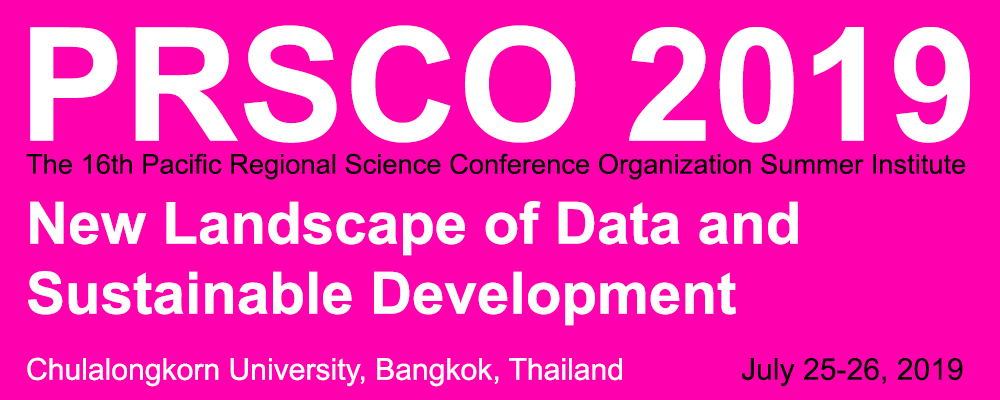
16th PRSCO Summer Institute
July 25-26, 2019, Bangkok, Thailand
http://www.th-rsai.org/prsco-2019/
Deadline for Abstract Submission: Extended to 31 March 2019
Regional Research Institute | Summer Course in Spatial Econometrics, June 25-28, 2019
Description:
The objective of the course is to provide a (not so short) introduction to spatial econometrics. Students will learn how to model and incorporate spatial dependencies into their empirical analyses. The course will cover basic as well as more advanced concepts ranging from the different typologies of spatial data, through the definition of connectivity in space (spatial weights matrices), to a comprehensive treatment of various spatial econometric models, both cross-sectional as well as panel. Estimation methods presented will include MLE (maximum likelihood), GMM (generalized method of moments), GLS (generalized least squares), and GS2SLS (generalized spatial two-stage least squares). The latter part of the course will deal with special topics such as panel data models and various testing procedures.
Instructor:
Gianfranco Piras, Associate Professor of Economics, The Catholic University of America, Washington, D.C.
Organization:
The course is organized into a format that includes morning (theoretical) lectures and afternoon computing lab and applications sessions.
Material:
Suggested readings include:
Kelejian H.H. and Piras G. (2017) “Spatial Econometrics, 1st Edition”, Academic Press.
Additional readings will be provided during the course.
Applications:
Applications Period Opens: January 8, 2019
Extended Application Deadline: April 23, 2019
Acceptance Notification: Two days after application is received.
Confirm Participation by April 27, 2019
Important Dates:
Applicants should submit a curriculum vitae and a brief statement of interest to This email address is being protected from spambots. You need JavaScript enabled to view it.. Applicants will be screened for suitable levels of prearation and background, and placed into the course on a first-come, first-served basis.
Fees: (Fees may change)
Course fees are $1,500. Fees cover course tuition, lunches and course material. Submitted fees will be non-refundable. Accommodation and other living expenses are not included. A block of rooms will be reserved at nearby hotels at a discounted rate.
Location:
The course will be hosted by West Virginia University’s Regional Research Institute located at 886 Chestnut Ridge Road, Morgan, WV, United States 26506.
http://rri.wvu.edu/2018-summer-course-in-spatial-econometrics/
10th Jean Paelinck Seminar of Spatial Econometrics, October 24-25, 2019, University of Zaragoza, Spain
10th Seminar Jean Paelinck
http://dae.unizar.es/10thseminarjp
On behalf of the Organizing Committee, we are pleased to invite you to Zaragoza (Spain) to the 10th edition of the Seminar of Spatial Econometrics in honor of Professor Jean Paelinck. The Seminar will be held in October 24-25, 2019.
The conference aims to provide a forum for debate between young and senior researchers and it is open to both theoretical and applied papers, which deal explicitly with questions of spatial statistics and econometrics. Welcomed contributions are related with the topic of the seminar: Spatial Big Data. Contributions dealing with other topics are also welcomed.
A workshop on Web scraping with R will be held for participants in the seminar.
PHD STUDENTS
To encourage the participation of young researchers, the GAEC group offers 2 grants for PhD students, which include free registration and accommodation. A selection process will be carried out to select the best two papers among applicants.
Paper submission for Ph.D. Students: July 25, 2019
CONFIRMED KEYNOTE SPEAKERS:
Dr. Giuseppe Arbia. Università Cattolica del Sacro Cuore
Dr. Javier Gutiérrez. Universidad Complutense de Madrid
Dr. Javier J. Pérez. Bank of Spain
Important dates
Abstract submission: July 25, 2019
Full paper submission: September 8, 2019
Notification of acceptance: September 22, 2019
Registration: October 13, 2019
You are invited to submit your paper or abstract to the following email address:
This email address is being protected from spambots. You need JavaScript enabled to view it.
More information concerning the workshop is available at:
About Us
The Regional Science Association International (RSAI), founded in 1954, is an international community of scholars interested in the regional impacts of national or global processes of economic and social change.

